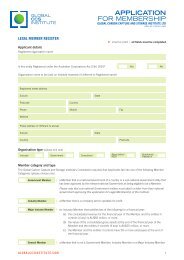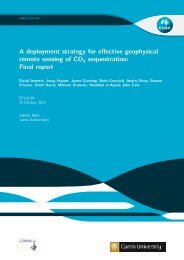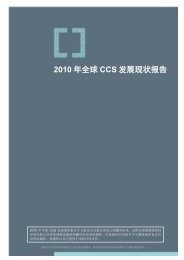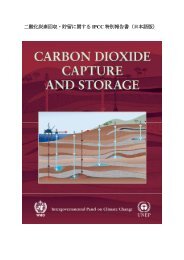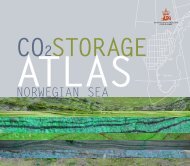1CHAPTERIntroductionnetwork to benefit both climate change policies and <strong>the</strong> investment climatein <strong>the</strong> port. The conditions described above create economies of scale andhelp to lower <strong>the</strong> overall cost of implementing <strong>CCS</strong>. Perhaps <strong>the</strong> mostattractive benefit of a Rotterdam-based <strong>CCS</strong> network is that it wouldaccelerate <strong>CCS</strong> deployment by providing a CO 2transport and storageinfrastructure with associated facilities such as transhipment and processing.The Port of Rotterdam,in cooperation with OCAP, Gasunie and Stedin isdeveloping <strong>the</strong> Rotterdam CO 2Common Carrier Pipeline (R3CP), a collectionnetwork for CO 2in <strong>the</strong> port. This carrier will yield <strong>the</strong> lowest costs for CO 2transportation to <strong>the</strong> Maasvlakte for market parties. This will facilitateemitters, who are currently considering implementing CO 2capture, andoffshore storage and/or enhanced oil recovery (EOR).1.1.3. Rotterdam-based companies join forcesRCI and its partners are at <strong>the</strong> forefront of global <strong>CCS</strong> development, both in<strong>the</strong> power sector and <strong>the</strong> heavy industry. In <strong>the</strong> power sector E.ON andElectrabel are jointly developing ROAD, a post-combustion capture projectat <strong>the</strong> E.ON coal/biomass power plant. This project has already securedsubstantial funds from <strong>the</strong> EU and <strong>the</strong> Dutch government. An industrialproject is being developed by Air Liquide, intending to capture and store CO 2arising from <strong>the</strong> production of hydrogen. These initiatives are supported by<strong>the</strong> CINTRA-consortium an alliance between Gasunie, Vopak, Anthony Vederand Air Liquide, for <strong>the</strong> exploitation of a CO 2terminal and CO 2transport byship and <strong>the</strong> development of <strong>the</strong> Common Carrier Pipeline (R3CP).RCI has a long established cooperation with private initiatives. This collaborationhas culminated in a substantial number of Letters of Cooperation(LoCs) with projects, including: CINTRA, Maersk, E.ON, Electrabel, Air Liquide,Air Products and Shell. As a follow-up on <strong>the</strong>se bi-lateral agreements, RCI isseeking ways to streng<strong>the</strong>n <strong>the</strong> cooperation between <strong>the</strong> front runnercompanies, to continue working towards <strong>the</strong> development of a Rotterdam<strong>CCS</strong> Network. O<strong>the</strong>r stakeholders, including local communities, <strong>the</strong> Dutchand EU governments and o<strong>the</strong>r companies in <strong>the</strong> port of Rotterdam who areinterested in implementing <strong>CCS</strong> at a later stage, support <strong>the</strong> efforts of <strong>the</strong>secompanies. The <strong>CCS</strong> Business Platform, hosted by Deltalinqs, provides amutual basis for information exchange and learning in a public-privatesetting, in a transparent manner.1.1.4. (Inter)national networkThroughout <strong>the</strong> world, many initiatives are taken to establish <strong>CCS</strong> projects.RCI collaborates closely with o<strong>the</strong>r <strong>CCS</strong> initiatives around <strong>the</strong> world. It is apartner in <strong>the</strong> Clinton Climate Initiative and has, in cooperation with andfinanced by <strong>the</strong> <strong>Global</strong> Carbon Capture Storage <strong>Institute</strong> (G<strong>CCS</strong>I), initiated astudy on <strong>the</strong> liquid logistics concept (which resulted in <strong>the</strong> CINTRA-consortium),<strong>the</strong> independent storage assessment and a study on lessons learnt.The activities of RCI are also supported by <strong>the</strong> European Climate Foundation.Fur<strong>the</strong>rmore, RCI is involved in European initiatives on <strong>CCS</strong>, such as<strong>the</strong> Berlin Forum on (sustainable) fossil fuels, <strong>the</strong> European TechnologyPlatform for Zero Emission Fossil Fuel Power Plants and <strong>the</strong> North Sea BasinTask Force.8
1CHAPTERIntroductionRegions play a vital role in establishing <strong>CCS</strong>. They are key in facilitatingimplementation of projects and are in many cases also <strong>the</strong> drivers for <strong>CCS</strong>and <strong>CCS</strong> networks. This is why RCI is one of <strong>the</strong> initiators of closer cooperationbetween <strong>the</strong> <strong>CCS</strong> regions in Europe. The regions include Scotland,Yorkshire and Humber, Le Havre, North Rhine Westphalia, Brandenburg andEemshaven. This cooperation allows <strong>the</strong> regions to share knowledge andexperiences, raise key issues at <strong>the</strong> appropriate levels of government and bea sparring partner for institutions such as <strong>the</strong> European Commission.In <strong>the</strong> Ne<strong>the</strong>rlands, RCI participates in <strong>the</strong> Dutch <strong>CCS</strong> R&D programmeCATO2 and collaborates closely with Eemshaven - Energy Valley, ano<strong>the</strong>rDutch region that offers good long-term <strong>CCS</strong> development prospects.1.2. The Case StudyThe RCI is thus working hard to realise <strong>CCS</strong> in <strong>the</strong> Rotterdam area. <strong>CCS</strong>activities in Rotterdam commenced in 2006 and until now more than 18major companies cooperated to provide feasibility level engineering studiesfor CO 2capture projects and a <strong>CCS</strong> infrastructure network. The Rotterdamapproach appears to be effective. Domestically and internationally, peoplehave expressed interest in <strong>the</strong> Rotterdam approach and why <strong>the</strong> RCI is sosuccessful in promoting <strong>the</strong> development and deployment of <strong>CCS</strong>.RCI decided in 2010 to carry out a case study in which <strong>the</strong> practical experienceof <strong>the</strong> four-year-old Rotterdam <strong>CCS</strong> project was central. The <strong>Global</strong> <strong>CCS</strong><strong>Institute</strong> (=<strong>the</strong> <strong>Institute</strong>) was interested in <strong>the</strong> results and decided tofinancially support <strong>the</strong> case study. RCI and <strong>the</strong> <strong>Institute</strong> phrased <strong>the</strong>following main research question: What can we learn from <strong>the</strong> Rotterdam<strong>CCS</strong> project? And formulated two subsequent objectives: (i) discover <strong>the</strong>lessons useful for <strong>the</strong> support of starting <strong>CCS</strong> projects around <strong>the</strong> globe and(ii) improvement of <strong>the</strong> Rotterdam <strong>CCS</strong> project itself.The first deliverable of <strong>the</strong> case study was <strong>the</strong> description of <strong>the</strong> researchmethod and approach (see ref. [1] and see figure). The case that was studiedwas <strong>the</strong> Rotterdam <strong>CCS</strong> cluster project 2 .2010 2011Exchange(Workshops)PreperationReconstructionCompletionEnrichmentsProjectmanagement2 Also o<strong>the</strong>r synonyms are used for a <strong>CCS</strong> Cluster project, like <strong>CCS</strong> Network project and <strong>CCS</strong> Hub.We formerly used <strong>the</strong> word <strong>CCS</strong> Network Project (see ref. [1]) that is why we still use word NetworkOrganiser. But nowadays <strong>the</strong> word cluster project is more in vogue. We adapted our vocabulary inthis <strong>report</strong> to that usage.9






